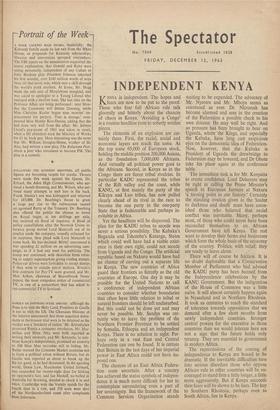INDEPENDENT KENYA
KENYAis independent. The hopes and _fears are now to be put to the proof.
Those who fear full African rule talk gloomily and bitterly about the chances of chaos in Kenya. 'Avoiding a Congo' is a routine headline even to soberly written pieces.
The elements of an explosion are cer- tainly there. First, the racial, social and economic layers are much the same. At the top some 65,000 of European stock, holding the middle position 200,000 Asians, as the foundation 7,000,000 Africans. And virtually all political power goes to the Africans. Second, in Kenya as in the Congo there are fierce tribal rivalries. In particular KADU represented the tribes of the Rift valley and the coast, while KANU, at first mainly the party of the Kikuyu and Luo tribes, has now pulled clearly ahead of its rival in the race to become the one party in the one-party State that is fashionable and perhaps in- evitable in Africa.
Yet the headlines will be disproved. The plan for the KADU tribes to secede was never a serious possibility. The Kabaka's Buganda and Tshoinbe's Katanga, States ' which could well have had a viable exist- ence in their own right, could not secede from Uganda and the Congo. The artificial republic based on Nakuru would have had no chance of carving out a separate life in Kenya. The new countries of Africa guard their frontiers as fiercely as the old countries of Europe. One day it may be possible for the United Nations to call a conference of independent African countries to consider whether boundaries that often have little relation to tribal or natural frontiers should be left undisturbed. But this could not be done yet and may never be possible. Mr. Sandys was cer- tainly wise to leave the problem of the Northern Frontier Province to be settled by Somalia, Ethiopia and an independent Kenya. There is no solution in sight. Per- haps only in a vast East and Central Federation can one be found. It is certain that Britain in the last days of her imperial power in East Africa could not have im- posed one.
The chances of an East Africa Federa- tion seem uncertain. After a country has achieved the status symbols of indepen- dence it is much more difficult for her to contemplate surrendering even a part of her sovereignty. But the framework of the Common Services Organisation stands waiting to be expanded. The advocacy of Mr. Nyerere and Mr. Mboya seems as convinced as ever. Dr. Nkrumah has become alarmed and sees in the creation of the Federation a possible check to his • own dreams: He may well be right. And so pressure has been brought to bear on Uganda, where the Kings, and especially the Kabaka, have long cast suspicious eyes on the democratic idea of Federation. Now, however, that the Kabaka is President of Uganda the drawbridge to Federation may be lowered, and Dr Obote take his place again at the conference table.
The immediate task is for Mr. Kenyatta to create confidence. Lord Delamere may be right in calling the Prime Minister's speech to European farmers at Nakuru `a turning point in our history.' Certainly the standing ovation given to the 'leader to darkness and death' must have, aston- ished those who believed that racial conflict was inevitable. Many, perhaps most, of those who could never have been reconciled themselves to an African Government have left Kenya. The rest want to develop their farms and businesses which form the whole basis of the economy of the country. Politics, with relief, they are ready to leave alone.
There will of course be friction. It is no doubt deplorable that a Conservative Member of Parliament who had advised the KADU party has been banned from the Independence celebrations by the KANU Government. But the indignation of the House of Commons was a little naive. It will almost certainly happen again in Nyasaland and in Northern Rhodesia. It took us centuries to reach the standard of tolerance towards oppositions that we demand after a few short months from newly independent countries. Stronger central powers for the executive in those countries than we would tolerate here are not a sign that the future holds only tyranny. They are essential to government in modern Africa.
The repercussions of the coming of independence to Kenya are bound to be dramatic. If the inevitable difficulties turn into serious disorders those who oppose African rule in other countries will be en- couraged to stand firma little longer, a little more aggressively. But if Kenya succeeds then. fears will be shown to be liars. The key to Southern Rhodesia, perhaps even to South Africa, lies in Kenya.






































 Previous page
Previous page